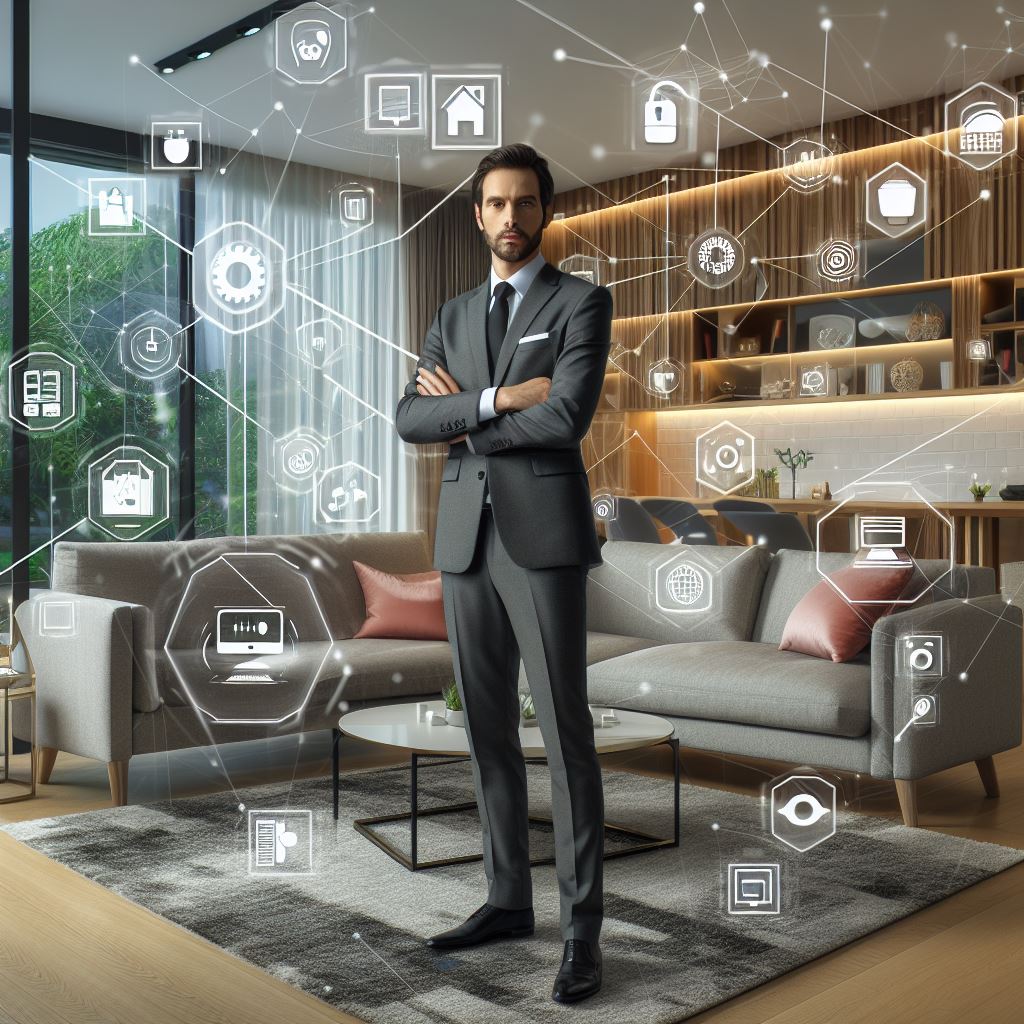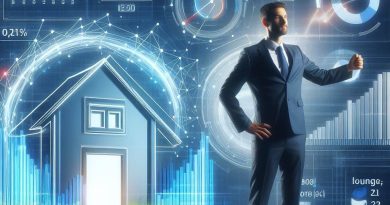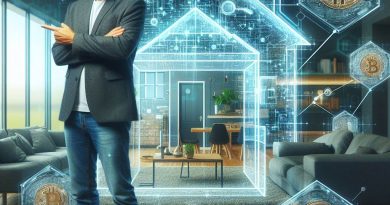The Future of IoT in Property Management Software
Last Updated on February 6, 2024
Introduction
The future of IoT in property management software is promising.
IoT, or the Internet of Things, refers to the interconnected network of devices, objects, and systems that communicate and share data with each other.
This technology has gained significance in various industries, including property management.
IoT plays a crucial role in property management as it enables the automation and optimization of various processes.
For instance, smart home devices can be integrated into property management systems to improve energy efficiency and security.
The benefits of IoT in property management software are manifold.
Firstly, it enhances operational efficiency by providing real-time insights into property conditions and performance.
Property managers can remotely monitor and control devices such as thermostats, lighting systems, and security cameras.
Furthermore, IoT improves the overall tenant experience.
By leveraging IoT-enabled devices, property owners can offer enhanced amenities and services.
For example, residents can use their smartphones to control the temperature of their units or access community amenities such as gyms and pools.
IoT also contributes to cost savings in property management.
For instance, through predictive maintenance, property managers can identify potential issues before they become major problems, reducing repair costs and minimizing downtime.
In fact, IoT has emerged as a game-changer in the property management industry.
It offers numerous benefits such as operational efficiency, improved tenant experience, and cost savings.
As technology continues to advance, the future of IoT in property management software looks bright.
Current State of IoT in Property Management Software
The integration of Internet of Things (IoT) technology into property management software heralds a new era of efficiency, convenience, and innovation in the real estate sector.
Let’s delve into the current state of IoT in property management software, examining its applications, examples, and the myriad benefits it offers.
In recent years, IoT has emerged as a game-changer in property management, revolutionizing how buildings and facilities are monitored, maintained, and optimized.
IoT devices such as sensors, cameras, and smart meters are increasingly being deployed to collect data in real-time, providing invaluable insights into various aspects of property operations.
Overview of the Current Use of IoT in Property Management
IoT is currently utilized in property management for a wide range of functions including:
- Remote Monitoring: Property managers can remotely monitor the status of various systems such as HVAC, lighting, and security through IoT-enabled sensors and cameras.
- Predictive Maintenance: IoT data analytics allow for predictive maintenance, enabling proactive identification and resolution of issues before they escalate, thus minimizing downtime and repair costs.
- Energy Management: Smart meters and sensors help optimize energy usage by providing real-time data on consumption patterns, enabling property managers to implement energy-saving measures effectively.
Examples of How IoT is Being Integrated into Software Solutions
Leading property management software providers are integrating IoT functionalities into their platforms. For instance:
- Real-Time Alerts: Software solutions leverage IoT data to generate real-time alerts for maintenance issues, security breaches, or anomalies in energy consumption.
- Automated Workflows: IoT-enabled software automates routine tasks such as scheduling maintenance, adjusting temperature settings, or managing access control systems.
- Data Visualization: Advanced analytics tools visualize IoT data, allowing property managers to gain actionable insights and make informed decisions about resource allocation and optimization.
Benefits and Advantages of Using IoT in Property Management
The adoption of IoT in property management software offers numerous benefits, including:
- Cost Savings: Proactive maintenance and energy optimization lead to reduced operational costs and increased asset longevity.
- Enhanced Tenant Experience: IoT-enabled amenities such as smart thermostats and keyless entry systems enhance tenant comfort and convenience, leading to higher satisfaction and retention rates.
- Data-Driven Decision Making: Access to real-time data enables property managers to make data-driven decisions, optimize resource allocation, and improve overall operational efficiency.
In short, IoT is poised to play an increasingly pivotal role in property management software, offering unparalleled opportunities for optimization, automation, and innovation in the management of real estate assets.
Read: Experience Architecture with VR
Trends and Innovations in IoT for Property Management Software
In recent years, the integration of Internet of Things (IoT) technology into property management software has revolutionized the way properties are managed and maintained.
From optimizing energy efficiency to enhancing security measures, IoT has become a cornerstone in the evolution of property management.
Let’s delve into the latest trends and innovations driving this transformation.
- Enhanced Automation: IoT-enabled property management software is increasingly automating routine tasks such as temperature control, lighting adjustments, and appliance monitoring. This not only streamlines operations but also reduces energy consumption and operational costs.
- Predictive Maintenance: Leveraging IoT sensors, property managers can now predict maintenance issues before they escalate into costly repairs. By analyzing data on equipment performance and usage patterns, proactive maintenance schedules can be created, ensuring optimal functionality of essential systems.
- Smart Security Solutions: IoT-based security systems are becoming more sophisticated, offering real-time monitoring and alerts for unauthorized access, fire hazards, and environmental threats. Integrated with property management software, these solutions provide comprehensive security coverage and peace of mind for tenants and owners alike.
Innovative Solutions
- Smart Metering: IoT-enabled metering systems enable precise monitoring of water, electricity, and gas consumption in real-time. This data empowers property managers to identify inefficiencies and implement strategies for conservation, ultimately reducing utility costs.
- Remote Access Control: Advanced access control systems utilizing IoT technology allow property managers to remotely grant or revoke access to buildings, units, and amenities. This enhances security and convenience for tenants while enabling efficient management of property access.
Case Studies of Successful Implementations
- XYZ Apartments: By integrating IoT sensors into their HVAC systems, XYZ Apartments reduced energy consumption by 20% while maintaining tenant comfort levels. Predictive maintenance alerts also prevented costly equipment failures, saving the property thousands in repair expenses.
- ABC Commercial Real Estate: ABC Commercial Real Estate implemented IoT-based security cameras and access control systems across their properties, resulting in a 30% decrease in security incidents. Real-time monitoring and alerts allowed for swift response to potential threats, ensuring tenant safety and property protection.
In essence, the future of property management software lies in the continued advancement of IoT technology.
By embracing these trends and innovations, property managers can optimize operations, enhance security, and improve tenant satisfaction, ultimately driving greater value for property owners and stakeholders.
Read: AI in Real Estate: Transforming Property Management

Potential Impact of IoT on Property Management
The integration of Internet of Things (IoT) technology in property management software has the potential to revolutionize the industry.
By connecting physical devices and sensors to a network, property managers can unlock a range of benefits and advantages.
Exploring Potential Benefits and Advantages
- Improved Decision-Making: The real-time data provided by IoT devices enables property managers to make informed decisions.
- Enhanced Efficiency: IoT automates tasks such as energy management, maintenance, and security, leading to increased operational efficiency.
- Cost Savings: By optimizing resource utilization and reducing energy wastage, IoT can lead to significant cost savings for property owners.
- Streamlined Processes: IoT-enabled devices can streamline tasks like maintenance scheduling and automate routine procedures.
- Better Tenant Experience: With IoT, property managers can provide enhanced amenities and personalized services, improving tenant satisfaction.
Improving Efficiency and Automation
One of the major advantages of IoT in property management is its ability to improve efficiency and automate various tasks.
By collecting data from connected devices, property managers can gain insights into energy usage, occupancy patterns, and maintenance requirements.
For example, smart thermostats can adjust temperature settings based on occupancy, reducing energy waste.
IoT-enabled sensors can detect faults in infrastructure systems and trigger automated maintenance requests. This can not only save time but also prevent costly breakdowns.
Furthermore, IoT allows property managers to remotely control devices and perform tasks like unlocking doors or adjusting lighting settings.
This eliminates the need for physical visits, reducing response times and improving overall operational efficiency.
Addressing Concerns and Challenges
While IoT brings numerous benefits to property management software, there are also concerns and challenges that need to be addressed for its successful adoption.
Security and Privacy: As IoT devices collect significant amounts of sensitive data, ensuring data security and privacy is crucial.
Implementing robust cybersecurity measures and data encryption protocols is essential to protect against potential threats.
Compatibility and Integration: Integrating IoT devices with existing property management systems can be challenging.
Ensuring compatibility and seamless integration is necessary to harness the full potential of IoT technology.
Property managers and staff may require training to effectively utilize and manage IoT devices.
Acquiring necessary skills and knowledge is crucial to maximize the benefits of IoT in property management.
Adopting IoT in property management involves upfront costs for acquiring and installing devices, sensors, and infrastructure.
However, the potential long-term cost savings and efficiency gains often outweigh the initial investment.
Property managers need to ensure compliance with regulations related to data collection, storage, and usage to avoid legal issues and maintain trust with tenants and stakeholders.
The future of IoT in property management software is promising, with the potential to significantly impact the industry.
By leveraging the benefits of IoT, property managers can improve decision-making, enhance efficiency, streamline processes, and deliver better experiences to tenants.
However, careful consideration of concerns and challenges, along with appropriate measures, is vital for successful IoT integration in property management systems.
Read: Building the Future: AR in Construction
The Role of Data and Analytics in IoT-enabled Property Management Software
The role of data and analytics in IoT-enabled property management software is crucial.
Data collection and analysis form the backbone of these solutions, allowing them to function effectively.
The Role of Data Collection and Analysis in IoT-enabled Solutions
Data collection involves gathering information from various IoT devices embedded in properties.
These devices can include sensors, smart meters, security cameras, and more.
The collected data is then processed and analyzed.
Analytics play a key role in extracting valuable insights from the collected data.
By using advanced algorithms and machine learning techniques, analytics software can identify patterns, trends, and anomalies in property-related data.
This data can include energy consumption, temperature, occupancy rates, maintenance needs, and more.
By analyzing this information, property management software can provide real-time updates on property conditions and help predict future maintenance requirements.
How Property Management Software Can Leverage IoT Data for Better Decision-Making and Optimization
IoT-enabled property management software can leverage the collected data to make better-informed decisions and optimize various aspects of property management.
For example, by analyzing energy consumption patterns, property managers can identify areas of wastage and take necessary measures to minimize energy usage, leading to cost savings and environmental sustainability.
In addition, occupancy data collected from various sensors can help property managers identify underutilized spaces that can be repurposed for other purposes or marketed more effectively.
IoT data can also facilitate predictive maintenance.
By analyzing real-time data on equipment performance, property managers can detect potential issues before they result in significant breakdowns, reducing downtime and improving tenant satisfaction.
The Importance of Advanced Analytics and Reporting in Managing Properties Efficiently
Advanced analytics and reporting capabilities are essential in managing properties efficiently in the IoT era.
By analyzing large volumes of data, property management software can quickly identify trends or issues that require immediate attention.
Real-time reporting allows property managers to address problems promptly and prevent further complications.
Moreover, advanced analytics can provide valuable insights into tenant behavior and preferences.
By analyzing data on tenant satisfaction, preferences, and complaints, property managers can tailor their services to meet tenant expectations and improve tenant retention rates.
The ability to generate detailed reports based on IoT data also facilitates better decision-making.
Property managers can analyze trends over time, identify areas of improvement, and make strategic decisions to enhance operational efficiency and maximize return on investment.
In summary, the role of data and analytics in IoT-enabled property management software is vital for efficient and effective property management.
Through data collection and analysis, as well as advanced analytics and reporting, property managers can maximize the potential of IoT data to make better decisions, optimize resources, and enhance tenant satisfaction.
Read: The Rise of AR in Home Renovations
Future Outlook and Predictions for IoT in Property Management Software
IoT has the potential to greatly enhance efficiency and convenience in property management.
From smart thermostats that optimize energy usage to sensors that detect leaks and other maintenance issues in real-time, IoT-enabled property management software offers unprecedented insights and control over building operations.
The future prospects and growth of IoT in the property management industry
One of the key predictions for the future of IoT in property management software is its widespread adoption across various types of properties, from residential complexes to commercial buildings.
As IoT technology becomes more affordable and accessible, property owners and managers will increasingly recognize its value in improving tenant satisfaction, reducing operational costs, and enhancing overall property performance.
Predictions on how IoT will continue to transform and revolutionize property management software
Furthermore, IoT is poised to continue transforming traditional property management practices.
Predictive maintenance powered by IoT sensors can help property managers detect and address issues before they escalate, minimizing downtime and costly repairs.
Data-driven insights derived from IoT devices can also inform strategic decision-making, allowing property managers to optimize space utilization, allocate resources more effectively, and enhance the overall tenant experience.
Insights into potential advancements and possibilities in the field
Looking ahead, advancements in IoT technology will further expand the possibilities for property management software.
Integration with artificial intelligence (AI) and machine learning algorithms will enable predictive analytics that anticipate tenant needs and preferences, personalized recommendations for energy conservation, and even autonomous building management systems.
The integration of IoT (Internet of Things) technology into property management software has already begun to revolutionize the way properties are managed and maintained.
As we look ahead, the future prospects for IoT in this industry are undeniably bright, with continued growth and transformation on the horizon.
Therefore, the future of IoT in property management software is promising and full of potential.
As IoT technology continues to evolve and become more sophisticated, it will undoubtedly revolutionize the way properties are managed, leading to greater efficiency, sustainability, and tenant satisfaction.
Property managers who embrace and leverage IoT solutions will be well-positioned to thrive in the dynamic landscape of the property management industry.
Conclusion
IoT has revolutionized property management software by providing numerous benefits and advantages.
Firstly, IoT allows for remote monitoring and control of various devices and systems, enhancing efficiency and convenience.
Secondly, it enables real-time data collection and analysis, facilitating better decision-making and predictive maintenance.
Moreover, IoT enhances security through automated monitoring and alerts for potential risks or breaches.
By embracing IoT, property management professionals can gain a competitive edge in the industry.
Staying up-to-date with technological advancements is crucial for success in the digital age.
Therefore, it is imperative for professionals to explore and adopt IoT solutions to optimize their operations and service quality.
By leveraging IoT, they can streamline processes, reduce costs, and improve tenant satisfaction.
So, don’t hesitate to embrace IoT and unlock the potential of property management software today!


